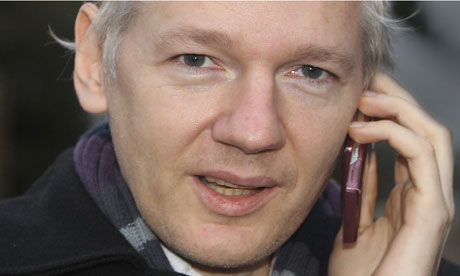Julian Assange defends decision not to face questioning in Sweden
WikiLeaks founder says he is not obliged to return to be questioned over sexual assault allegations

Julian Assange today defended his decision not to return to Sweden for questioning over allegations of sexual assault, saying he did not need to be "at the beck and call of people making allegations".
The WikiLeaks founder said he was not obliged to return to the country, adding that there were "serious problems" with the prosecution against him.
In a separate interview, Assange said documents had been leaked to the Guardian by the Swedish authorities in an attempt to "undermine" his bail application hearing last week.
Speaking from the mansion in East Anglia where he is staying under the terms of his bail, he told BBC Radio 4's Today programme: "I don't need to go back to Sweden.
"The law says that I also have certain rights, and these rights mean that I do not need to speak to random prosecutors around the world who simply want to have a chat, and won't do it in any other standard way."
Assange said he had waited in Sweden for five weeks to be interviewed by police – "so I can put my side of the case forward" – but the interview did not happen. He added that he had been told there was no reason for him to remain in the country.
Asked by the BBC's John Humphrys why he would not return to Sweden to deal with the allegations, Assange said: "If they want to charge me, they can charge me. They have decided not to charge me.
"They have asked, as part of their application, that if I go to Sweden and am arrested, I am to be held incommunicado. They have asked that my Swedish lawyer be gagged from talking to the public."
Asked by Humphrys: "Are you a sexual predator?" Assange said the suggestion was "ridiculous", adding: "Of course not". The Today presenter then asked Assange how many woman he had slept with.
The WikiLeaks founder refused to answer, saying: "A gentleman doesn't count."
Discussing the change WikiLeaks had brought through its publications, Assange said the organisation had "changed governments – we have certainly changed many political figures within governments".
The discussion was broadcast as the Times published its own interview with Assange, in which he said documents had been leaked to the Guardian in an attempt to "undermine" his final bail hearing, held on 16 December.
Assange was granted bail on 14 December, but remained in prison for a further two days after the Swedish authorities challenged the decision.
The Times reported that Assange was unhappy with the Guardian for "selectively publishing" sections of the documents.
The Guardian was allowed access to unredacted statements held by prosecutors in Stockholm, including interviews with some of the central characters.
The article in question was published in the Guardian newspaper on Saturday 18 December, and online at 9.30pm on Friday 17 December. It is understood Assange's defence team had seen copies of everything seen by the Guardian.
"The leak of the police report to the Guardian was clearly designed to undermine my bail application," Assange told the Times. "It was timed to come up on the desk of the judge that morning."
He added: "Someone in authority clearly intended to keep Julian in prison."
